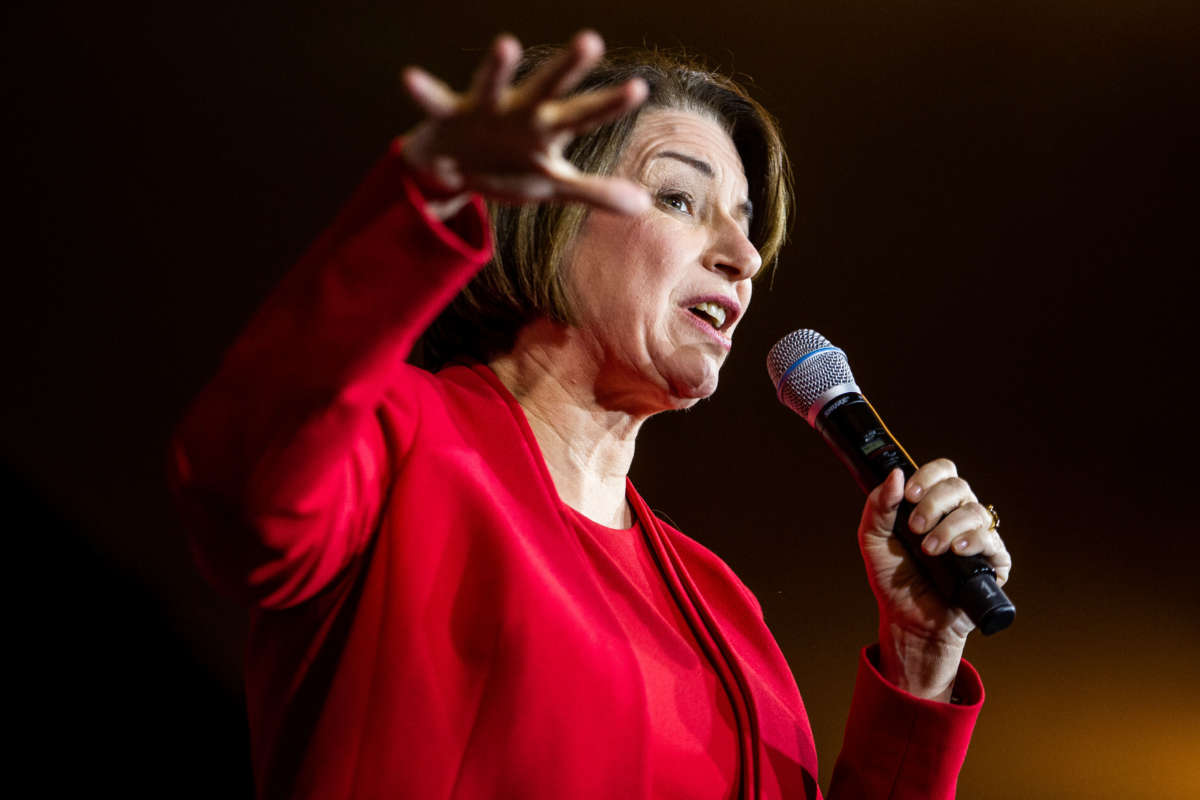As activists around the country work to defund police departments, the Democratic Party’s presumptive presidential nominee is considering a senator who worked to boost police department budgets as his running mate.
Minnesota Senator Amy Klobuchar, who is on Biden’s vice president shortlist, introduced legislation in 2018 to reauthorize a Department of Justice program called COPS on the Beat that provides grants to state and local law enforcement agencies to hire more officers and to increase the program’s funding from about $260 million per year to $400 million per year. Klobuchar’s bill was endorsed by law enforcement lobbying groups including the Fraternal Order of Police, National Association of Police Organizations, and the National Sheriff’s Association.
“Our bipartisan legislation would ensure this program is supported so local police departments can hire and provide needed training to law enforcement officers,” Klobuchar said upon introducing her bill, which was co-sponsored by Sen. Lisa Murkowski (R-Alaska).
Klobuchar’s bill did not become law, but its proposed budget of $400 million for the program did take effect this year. The $400 million figure was endorsed in an April 2019 letter signed by 43 senators and that amount was made available for COPS on the Beat grants in FY2020, according to the program’s website. Last week, DoJ announced $393 million in grant awards under the program, which it says will allow 596 law enforcement agencies across the country to hire an additional 2,732 full-time law enforcement officers.
Klobuchar has received more campaign funding from police union and law enforcement PACs than all but one other member of the Senate, according to data compiled by the Center for Responsive Politics. Since joining the Senate in 2007, Klobuchar has taken $15,000 from the National Fraternal Order of Police PAC. The top Senate recipient of law enforcement PAC money is Sen. Pat Leahy (D-Vt.), who has received $21,250 and co-sponsored Klobuchar’s bill.
The COPS on the Beat program was established by the 1994 crime bill that Joe Biden wrote when he was chairman of the Senate Judiciary Committee. According to the COPS Office, an entity created to administer funds, the funds are meant to “increase community policing capacities and support crime prevention efforts.” However, the meaning of “community policing” for purposes of the program — as John Jay College of Criminal Justice professor David M. Kennedy told The Appeal — has varied: “different presidential administrations and congressional initiatives have used the COPS office as a vehicle for a wide range of funding and policy directions.”
Since 1995, COPS on the Beat has provided law enforcement agencies with more than $19 billion, according to information from the Congressional Research Service. More than $10 billion of that funding was provided for programs to hire new police officers or rehiring officers who had been laid off.
A 2019 version of the COPS Reauthorization Act was drafted by Klobuchar and set to be introduced during National Police Week, according to a report by Akela Lacy for The Intercept, but congressional records indicate that the bill was never formally submitted. An April 2019 legislative update from the National Association of Police Officers said the organization was working with Klobuchar on the legislation.
Klobuchar has also proposed a bill called the COPS Improvement Act in multiple sessions of Congress. The bill would codify the COPS office within federal law and establish several new programs within it, like a troops-to-cops program and an initiative to fund the development and use of new crime-prevention technologies. The National Association of Police Officers says it “worked closely with Senator Klobuchar’s staff as the bill was drafted,” and the organizations issued a statement of support for it. The National Fraternal Order of Police also endorsed the bill.
Joe Biden does not support defunding police departments in their current forms, according to statements to the press made by his campaign, and he has been joined in his opposition to defunding by several high-ranking Democrats including House Majority Whip Jim Clyburn (D-S.C.) and House Judiciary Committee Chairman Jerry Nadler (D-N.Y.).
Before being elected senator in 2006, Klobuchar was the top prosecutor for Hennepin County, which includes Minneapolis, elected to the position of county attorney in 1998 and reelected in 2002. During her tenure, Klobuchar declined to bring charges against several police officers who shot and killed people, choosing instead to refer the cases to grand juries, a process that legal experts say often favors police and helps them avoid prosecution. Klobuchar recently said that she regrets referring the cases to grand juries, but noted that the use of grand juries for officer-involved shootings “was true in every jurisdiction across our state and many jurisdictions across the country.”
Trump is silencing political dissent. We appeal for your support.
Progressive nonprofits are the latest target caught in Trump’s crosshairs. With the aim of eliminating political opposition, Trump and his sycophants are working to curb government funding, constrain private foundations, and even cut tax-exempt status from organizations he dislikes.
We’re concerned, because Truthout is not immune to such bad-faith attacks.
We can only resist Trump’s attacks by cultivating a strong base of support. The right-wing mediasphere is funded comfortably by billionaire owners and venture capitalist philanthropists. At Truthout, we have you.
Truthout has launched a fundraiser, and we have only 72 hours left to raise $24,000. Please take a meaningful action in the fight against authoritarianism: make a one-time or monthly donation to Truthout. If you have the means, please dig deep.
